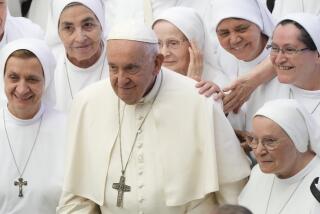Bishops Urge Greater Direction of Economy : New Pastoral Letter Implicitly Raps Some Reagan Policies, Cites Perils of Unregulated Capitalism
- Share via
Reaffirming their strong commitment to economic justice, the nation’s Roman Catholic bishops Sunday released a new draft of a letter on the U.S. economy that calls poverty a “scandal” and urges greater governmental direction of the country’s economic affairs.
The second draft of the pastoral letter, titled “Catholic Social Teaching and the U.S. Economy,” was mailed to the nation’s 300 bishops, archbishops and cardinals on Oct. 1 and will be discussed at the prelates’ national meeting in Washington on Nov. 11 to 15. The letter will undergo further revision before a final version is adopted in November of 1986.
The first draft of the document, released a year ago, generated widespread debate and attention. Both drafts implicitly criticize some Reagan Administration policies, warn of the dangers of wealth and unregulated capitalism and attack American development policies abroad.
Responses to Criticism
The 40,000-word second draft represents the drafting committee’s responses to more than 10,000 pages of comment and criticism of the original document from Catholics throughout the country.
“The second draft does not change the core message of the (original) document,” said Archbishop Rembert Weakland of Milwaukee, chairman of the drafting committee of five bishops. “We do not back away from our strong conviction that more can and must be done to fight poverty and unemployment.”
“A preferential option for the poor,” a controversial key phrase in the first draft of the letter, is retained in the second version. But the context of that theme has been changed in response to criticism that it appeared to pit the middle class against the poor.
“The new draft attempts to build bridges of responsibility between the poor, the middle and affluent classes,” Weakland said.
‘Large Inequities’
One major addition in the new text, reflecting suggestions from many bishops, is a stronger emphasis on the negative economic impact of military spending.
“The investment of human creativity and material resources in the production of weapons of war makes these economic problems even more difficult to solve,” the second draft says. “Minds and money that could better human life are diverted to projects that threaten death.”
The new draft reiterates the bishops’ concern for overcoming “large inequities” in the income levels of American families and lowering the current unemployment rate, which the bishops call “morally unacceptable.”
The pastoral proposes seven targets of reform to fight poverty: building a healthy economy, removing barriers to full and equal employment for women and minorities, promoting self-help among the poor, changing the tax system to benefit the poor, improving the quality of education for poor children, strengthening family stability, and overhauling welfare programs.
Defenders of Capitalism
Much of the criticism of the first draft came from conservative defenders of capitalism, who said the original text recommended a revival of large-scale social programs in the style of the New Deal or Great Society and promoted impractical governmental intervention in the market economy to solve economic ills.
Referring to the extreme ideologies of left and right, the new text states that “Catholic social teaching has traditionally rejected both . . . for they are likely to produce results contrary to human dignity and economic justice. Nor is it the role of the church to create or promote a ‘third way’ or a specific new economic system.”
The revised draft, Weakland said, is “reformist,” repudiating “collectivism” and “any dehumanizing tendencies within capitalism.”
The bishops’ pastoral is not morally binding for the nation’s 52 million Catholics. However, when adopted in its final form, it will represent the collective teaching of the American Catholic hierarchy and will be used as a source for preaching and teaching in the country’s 19,000 Catholic parishes, as well as in church-related schools and universities.
More to Read
Sign up for Essential California
The most important California stories and recommendations in your inbox every morning.
You may occasionally receive promotional content from the Los Angeles Times.












